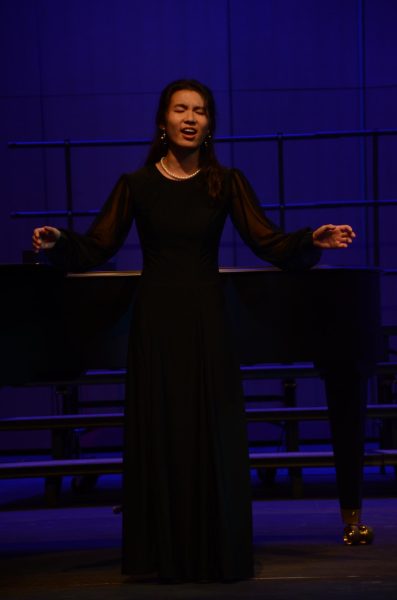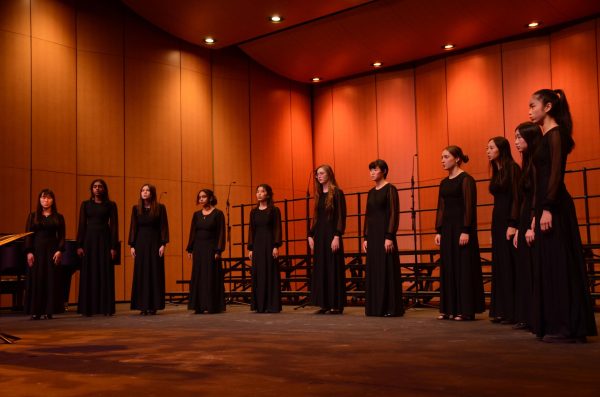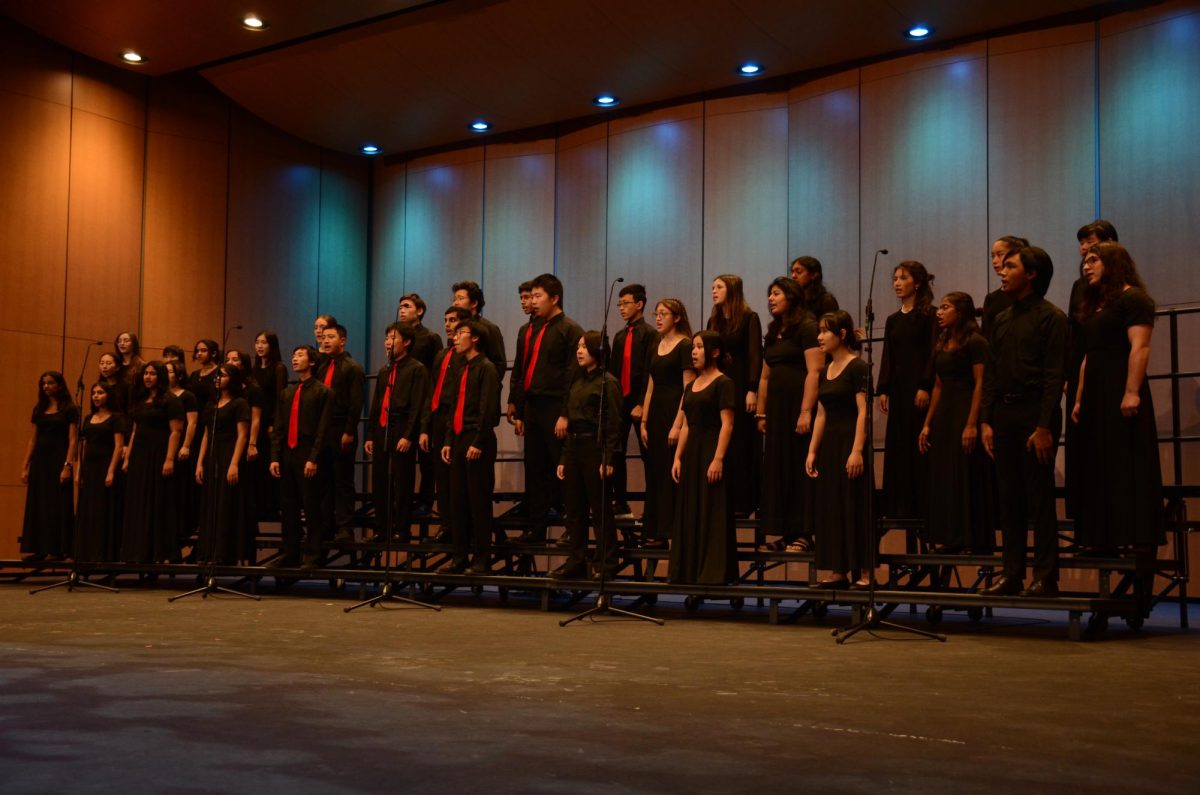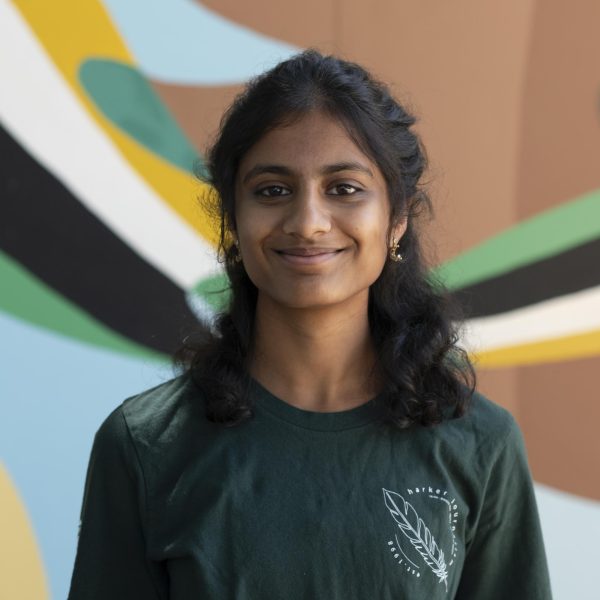Cantilena singers gather on stage in a half circle, their faces shining in blue and purple light. A moment of quiet elapses before choir director Susan Nace raises her arms, setting the song “Voices of the Universe” in motion. The students’ voices ring through the air, soft yet resounding, cutting through the silence of the theater. They blend together to create a dissonant, dreamy unity through vocal storytelling.
From the hauntingly ethereal harmonies of “Voices of the Universe” to the serene melodies of “Duo Seraphim” to the grandiose resonating tones of “Aurora Lucis Rutilat”, Harker’s fall choral concert “From Outer Space” captured the universality of human creativity on Nov. 11.
Led by choir directors Susan Nace and Jennifer Sandusky, this concert featured treble chamber choirs Cantilena and Dolce Voce, bass and tenor choir Rhapsody and the combination of Rhapsody and Dolce Voce, Festival Chorus.
Nace and Sandusky began compiling music for the concert almost a year ago. After they chose pieces related to the show’s themes of universality and mythology, rehearsals began in September, focusing on fine-tuning every note and harmony.
“With singing, to be able to get the beautiful sounds that we do, there is so much that goes into it,” Nace said. “Just like with an instrumentalist learning how to hold their bow correctly and where to bow on their string, and how to tune every single note. When we’re singing, it’s the same way, and we also have to make the words fit with the pitch.”
Festival Chorus commenced the concert with a performance of a South African freedom song, “Tshotsholoza,” meaning “make way for the next man.” Originally used to encourage diamond and gold miners, the song garnered the title of South Africa’s unofficial anthem over the years. Frosh Brianna Madrigal, sophomore Ishan Mysore and junior Jason Shim performed solos during the performance while sophomore Simon Kirjner and seniors Sriram Bhimaraju and Ian Ogden accompanied with percussion.

Elizabeth Alexander’s “How to Sing Like a Planet” followed. Inspired by Renaissance humanist beliefs about Earth’s natural music, the song offers a whimsical and humorous manual on how people can channel the planet’s music in their singing. Festival Chorus debuted last year and officially entered Harker’s choral roster this year.
Rhapsody then sang “Omnia Vincit Amor,” composed by John Michael Trotta. Dolce Voce subsequently performed Andrea Ramsey’s “Aurora Lucis Rutilat,” a song exploring the contrast between heaven and hell. A string quartet including George Yang (10) and Aaron Ma (9) on the violin, David Tang (9) on the viola, and Dustin Miao (12) playing the cello accompanied the piece.
Cantilena seniors and soloists Katelyn Hsu and Miki Mitarai performed Robert Schumann’s “Widmung” and C.W. Gluck’s “Che faró senza Euridice” respectively. Katelyn chose “Widmung” because of her familiarity with the piece and its sweet message.
“The piece was written by Schumann for his future wife, so it was really sweet,” Katelyn said. “When I did the word-for-word translation, I could just feel the love pouring out of the music. That kind of message usually conveys quite well with the audience.”
Cantilena then joined them for “Voices of the Universe” composed by Nicholas Ryan Kelly, a piece based on the poem “Proud Music of the Storm” by Walt Whitman. They also sang “Duo Seraphim,” a religious Latin poem composed by Sister Agata.
“I think Cantilena puts a lot more emphasis on singing together,” Cantilena soprano Carissa Wu (10) said. “A big thing is tuning together and matching vowels, and I think I learned a lot from that. I like how everyone has something to bring to the table.”
Cantilena also sang Abbie Betinis’s “Jerusalem Luminosa.” Sonya Apsey (12) introduced the piece, noting its relevance because of the recent tragedies in the Middle East. Carissa said Cantilena prepared the song during a three-week absence from Ms. Nace.
“During dress rehearsal, it didn’t feel like we were quite as solid as we wanted to be,” Carissa said. “Especially for ‘Jerusalem Luminosa,’ we were all scared that we were going to sing the wrong part or sound wrong. But overall, I think the performance went really well.”
Katelyn led many of Cantilena’s class rehearsals during Nace’s absence.
“It was like a feedback loop,” Katelyn said. “You listen, you see what they need and then we work on it. If we had rhythm problems, we would just speak the music, and then we would sing. Otherwise, if we had no issues, then we would spend some time in our individual sectionals to workshop before putting everything together.”

Near the end of the concert, all choirs joined together. The narrators, accompanists and soloists received flowers.
All choirs sang “Musica est Dei donum optimi,” composed by Orlande de Lassus. The title of the song translates from Latin to “Music, the gift of the supreme God.” They finished the show with “The Harker School Song.”
Sandusky and Nace encourage students to attend more choral concerts to absorb the choirs’ musicianship and technical skills. Concerts allow students to self-reflect, Sandusky said.
“Concerts make us think of our humanity and who we are, and they help us contemplate our space in the world,” Sandusky said. “For the community, it’s a really great opportunity to just do a little self-exploration when they listen to the music. This concert in particular really beautifully served that with the theme of outer space and otherworldliness.”


















![“[Building nerf blasters] became this outlet of creativity for me that hasn't been matched by anything else. The process [of] making a build complete to your desire is such a painstakingly difficult process, but I've had to learn from [the skills needed from] soldering to proper painting. There's so many different options for everything, if you think about it, it exists. The best part is [that] if it doesn't exist, you can build it yourself," Ishaan Parate said.](https://harkeraquila.com/wp-content/uploads/2022/08/DSC_8149-900x604.jpg)




![“When I came into high school, I was ready to be a follower. But DECA was a game changer for me. It helped me overcome my fear of public speaking, and it's played such a major role in who I've become today. To be able to successfully lead a chapter of 150 students, an officer team and be one of the upperclassmen I once really admired is something I'm [really] proud of,” Anvitha Tummala ('21) said.](https://harkeraquila.com/wp-content/uploads/2021/07/Screen-Shot-2021-07-25-at-9.50.05-AM-900x594.png)







![“I think getting up in the morning and having a sense of purpose [is exciting]. I think without a certain amount of drive, life is kind of obsolete and mundane, and I think having that every single day is what makes each day unique and kind of makes life exciting,” Neymika Jain (12) said.](https://harkeraquila.com/wp-content/uploads/2017/06/Screen-Shot-2017-06-03-at-4.54.16-PM.png)








![“My slogan is ‘slow feet, don’t eat, and I’m hungry.’ You need to run fast to get where you are–you aren't going to get those championships if you aren't fast,” Angel Cervantes (12) said. “I want to do well in school on my tests and in track and win championships for my team. I live by that, [and] I can do that anywhere: in the classroom or on the field.”](https://harkeraquila.com/wp-content/uploads/2018/06/DSC5146-900x601.jpg)
![“[Volleyball has] taught me how to fall correctly, and another thing it taught is that you don’t have to be the best at something to be good at it. If you just hit the ball in a smart way, then it still scores points and you’re good at it. You could be a background player and still make a much bigger impact on the team than you would think,” Anya Gert (’20) said.](https://harkeraquila.com/wp-content/uploads/2020/06/AnnaGert_JinTuan_HoHPhotoEdited-600x900.jpeg)

![“I'm not nearly there yet, but [my confidence has] definitely been getting better since I was pretty shy and timid coming into Harker my freshman year. I know that there's a lot of people that are really confident in what they do, and I really admire them. Everyone's so driven and that has really pushed me to kind of try to find my own place in high school and be more confident,” Alyssa Huang (’20) said.](https://harkeraquila.com/wp-content/uploads/2020/06/AlyssaHuang_EmilyChen_HoHPhoto-900x749.jpeg)




